Metronomy, "Hang Me Out To Dry"
Featuring Robyn. Robyn!

This is it. Next week is five days of pretending to be busy while everything around you is basically at a standstill in anticipation of Christmas coming, the week after is the dead time between Christmas and New Year’s, and the week after that is 2017. Do you know how exhausting 2017 is going to be? Of course you do, you are already exhausted of thinking about it. 2017 is going to make 2016 look like 2015 and the only thing that will get you through it is the possibility that there might not be a 2018 to suffer through. Anyway, all that is in your future. Right now it is still 2016, and today’s the last “real” Friday of that. Do the things you have to do to make sure that you make it through.
Here’s something from Metronomy — whose “Love Letters” of a few years back still goes through my head whenever that space is not taken up with more persistent ache-inducing sounds like Amy Grant’s “Every Heartbeat” or (to take a recent example) the “Growing Pains” theme or whatever — featuring Robyn. Robyn! It’s almost like you have to enjoy!
New York City, December 14, 2016

★★★ The sun put a gleam on things, and the wind was sharpening up. The crosswalk sign toward the shady side of the street brought on second thoughts. It was time to wash last winter’s grime off the cuffs of the hoodie that had gone under the parka every day then. By 2:30, the forecourt was lost in shadow again.
When The Rent Was Less Damn High
The end of stabilization
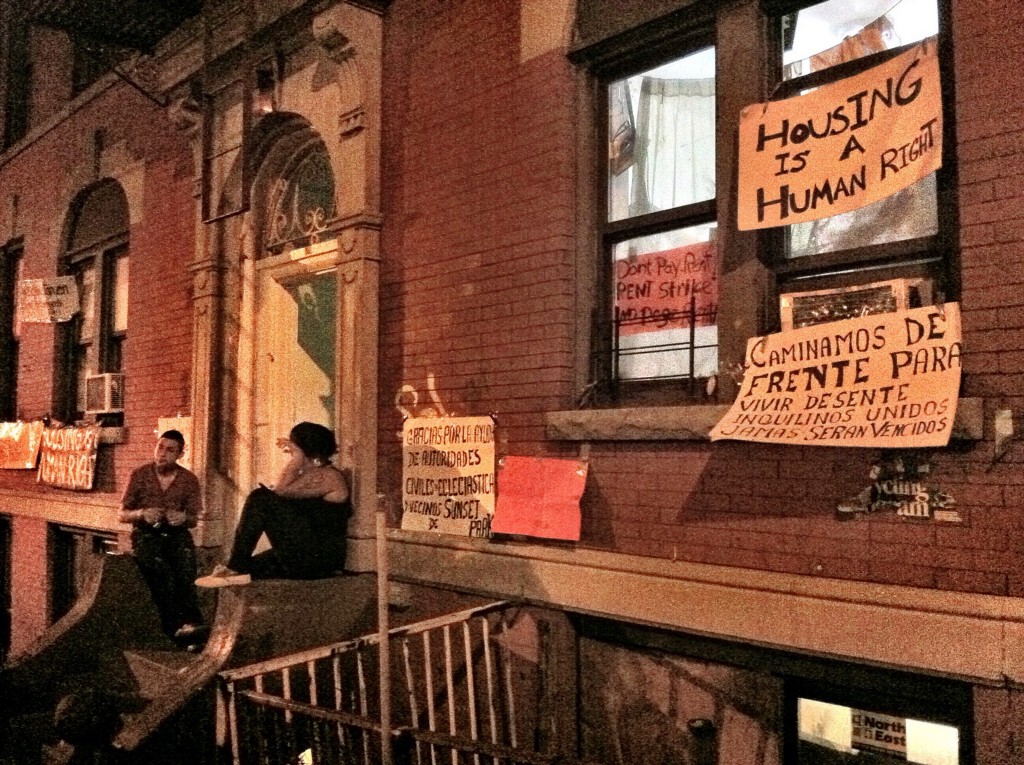
More than two decades later, it has become clear that the 1994 vote [on vacany decontrol] was more consequential for the lives of New Yorkers than anyone could have predicted at the time. Through dozens of interviews and research in state and city archives, ProPublica has unearthed the hidden history behind the vote… In a city where haves and have-nots have battled over affordable housing since the Civil War, the Council vote tilted the balance. Vacancy decontrol expanded the city’s tax base, and likely helped revive decaying neighborhoods, but at the cost of driving out longtime residents. Those dislodged had few other options, especially since New York’s population, which fell sharply in the 1970s, began to climb. For every rental unit added to the housing stock between 1993 and 2014, nine people moved into New York, according to a ProPublica analysis of city and census data.
Even if this piece didn’t have the quote “Could we envision that people would be moving to Bushwick and paying $2,000 an apartment?” in it, it would still be worth your time, but it does, so it absolutely is.
The Fateful Vote That Made New York City Rents So High
You may also enjoy this related 1997 debate on the topic between Malcolm Gladwell and Jacob Weisberg (Sample: “You’re playing a race card with a pretty low face value, given how much time you spend above 96th Street yourself, Malcolm”) that surely both of those guys would prefer to forget.
Shh, The Bees Are On
‘Bee Movie,’ but quieter

I’m not a clairvoyant, but I’m gonna guess you’re experiencing an atypical level of stress in your life right now. Maybe some unforeseen pressure or dread? I’m going to prescribe you some ASMR (or, autonomous sensory meridian response) content. Essentially, ASMR is videos of people making extremely gentle sounds in order to create that same tingly sensation you get when someone lightly drags their fingers across your skin.
The particular video I’m interested in showing you is from YouTuber Maple ASMR, who took one for the team this week by uploading something her commenters had demanded she attempt: the entire script to Bee Movie, whispered. The result is a one hour, six minute experience, jam packed with as many flatly-delivered bee puns as one body can handle.
“I did NOT skip ONE word,” she ensures us in the video’s description, and I believe her.
Why should you watch it? Idk, do you like memes? Feeling calm? The comedy of ’90s icon Jerry Seinfeld? There’s probably something here for you.
It’s not just for the uninitiated, either—I’ve seen the original movie a handful of times, but experiencing the script in this new format makes it feel fresh. You notice different things about a work of art when a disembodied mouth is whispering it into your ears at a low decibel. Take, for instance, the moment at around 8:52 when she says, “What do you think, pretty boy, are you bee enough?” Within the film, that’s more of a throwaway line—something that happens in a conversation that makes you go, “Heh,” but not laugh. In this video, though? I chuckled. “Bee enough.” Silly stuff!
Treat it like a guided meditation; light a candle, take a deep breath, and allow yourself to be carried away to a world where Jerry Seinfeld is a bee who falls in love with a woman and takes a bees’ rights case to court. You deserve it.
Yes, Virginia, 'Die Hard' is a Hanukkah Movie
Eight reasons the 1988 classic is a miracle for the Jews.
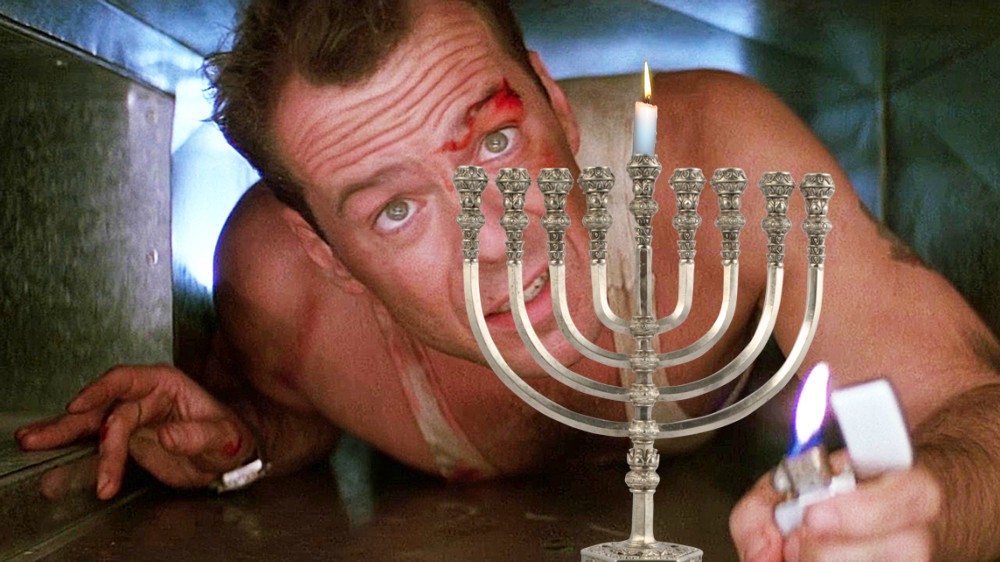
‘Die Hard’ is the Best Christmas Movie Ever Made!!
This cheerfully contrarian notion has become so pervasive that the film often airs in December alongside such acknowledged classics as It’s a Wonderful Life, Miracle on 34th Street, and A Christmas Story. But let’s be honest, other than the fact that it takes place on Christmas Eve and includes a few winking nods to the holiday (“NOW I HAVE A MACHINE GUN HO-HO-HO”), there’s really no justification for granting Die Hard a seat among the gods atop our cinematic yuletide Olympus.
But this doesn’t mean that Die Hard isn’t a fantastic holiday film. We’ve just been connecting it to the wrong winter holiday. With a nod to the eight candles on the menorah, here are eight reasons why Die Hard is actually The Best Hanukkah Movie Ever Made.

1) ’Tis the Season
Die Hard takes place on Christmas Eve, and Christmas often overlaps with Hanukkah (like this year, for example). Seasonally, Die Hard is just as much a Hanukkah movie as a Christmas one.
2) Jingle tells
Die Hard is framed by two pieces of influential holiday music, both with Jewish connections: At the movie’s end, as bearer bonds drift over L.A. like snowflakes, the song playing in the background is “Let It Snow,” which was written during a 1945 California heat wave by Jewish songwriters Sammy Cahn and Jule Styne. In the opening scene, the limo driver Argyle blasts Christmas in Hollis. Although this track was written and recorded by the (non Jewish) members of Run-DMC, it was produced by Rick Rubin, the Jewish co-founder of Def Jam Records, and inspired by their Jewish publicist, the legendary hip hop journalist Bill Adler.
Adler, who “grew up in a family of mouthy Jews” told the story on Rap Genius’s “Outside the Lines” podcast:
“I thought, let the guys write a new song, something that speaks to their lives, their neighborhood, and the ways in which they celebrate Christmas.”
The end result is a song that feels just as at home around a plate of latkes as a serving of collards. As Darryl “DMC” McDaniels puts it:
“I think the importance of food is a big part of the reason why that song was able to touch so many people…So not only does that record touch black people in the hood. It touches Jewish people, German people. It touches people all over the world.”
3) Schieß dem Fenster!
Hans Gruber is a member of the fictional radical group Volksfrei — a name that invokes the infamous Nazi slogan, Arbeit Macht Frei (“Work Makes You Free”) which adorned the gates to Auschwitz. And while Gruber is no Nazi, this movie features the most gleeful dispatching of German bad guys since Castle Wolfenstein, and not seen again until Tarantino’s Inglourious Basterds. And when Gruber orders his henchman to “shoot the glass!” he causes John McClane’s bare feet to suffer through their own personal Kristallnacht.
4) A Tale Told By A Jewish Scribe
I asked Steven E. deSouza, the screenwriter who co-wrote the screenplay to Die Hard, about his Jewish identity, and his thoughts on DHITBHMEM. deSouza confirmed he is a “practicing Jew,” who lights candles, supports his local synagogue, and sent his kids to Jewish day school. Then he told me about his ancestors, who were Spanish and Portuguese Jews that fled the Spanish Inquisition and settled in Jamaica in the 1600’s. Among them was Moses Cohen Henriques, whom deSouza describes as “a Jewish pirate who was an associate of Henry Morgan, and who particularly (and for obvious reasons) relished targeting Spanish ships.”
And there were other elements of deSouza’s family history that informed his penchant for penning action-packed thrillers:
“My father was a US naval officer in the Pacific theater in WWII…[He] taught me to use firearms when I was a teenager as what seemed to him a normal rite of passage…And in fact I gave my son a rifle for a Bar Mitzvah present, and only the reaction from other parents made me realize, hmm, apparently this seems strange in a Jewish family (but boy does this familiarity make all my gunfight scenes authentic). My youngest grandchild is named after a great-great-great grandfather on his Ashkenazi grandmother’s side, who was a prize fighter and actor in (fellow Jew) Bronco Billy Anderson’s silent westerns. So unlike many other Jewish families, I heard no direct stories about the Holocaust, or relatives lost to it. Instead, [I heard] stories about ancestors who were swashbuckling.”
So there you have it — Die Hard was written by a bad-ass Jamaican-American Jewish descendant of pirates and action heroes.
5) Tower of Power
In both Die Hard and the Hanukkah story, there is a building at the center of the story. In the Hanukkah story, the climactic moment comes when Judah Maccabee and his small band of guerrilla warriors defeat the mighty Greek army and reclaim the Holy Temple in Jerusalem from its villainous invaders. Likewise In Die Hard, Nakatomi Plaza must be reclaimed by our hero and cleansed of its villainous invaders.
6) Light and Miracles
Hanukkah celebrates bringing light into a world of darkness. In Die Hard, Hans repeatedly strives to snuff out the lights — first, by shooting out the police search lights during the siege, and then by darkening an entire city block in order to override the electromagnetic seal on the last of the seven locks in the Nakatomi vault (which deSouza told me reminded him of the Temple’s inner sanctuary). Hans values material wealth above human life, and so for him, this darkening leads to a perverse sense of the miraculous. As Hans gloats, “You asked for miracles, Theo, I give you the F.B.I.”
7) The Importance of Being J-Mac
Like John McClane (the other J-MAC), Hanukkah hero Judah Maccabee was outnumbered and outgunned, but he was able to use his homemade sling to pick off his enemies and turn the Greek’s superior firepower against them (“NOW I HAVE A SWORD AND CHARIOT HO-HO-HO”).
8) Alexander Wept
Here’s the deeper connection between Die Hard and Hanukkah — as much as they are stories about a victory against outside invaders, they are also meditations on an internal clash of cultures, and the struggle of the “good guys” with ambivalent feelings towards a world that is rapidly shifting under their (bloody) feet.
In the first third of Die Hard, the greatest source of tension isn’t a looming terrorist takeover of Nakatomi Plaza. It’s lifelong New Yorker McClane’s palpable anxiety at the prospect of living in L.A. With his signature puckered smirk, Willis greats every signifier of California living with a helpless mixture of bemusement and contempt. “Fuckin’ California!” is his rallying cry long before “Yippee-Ki-Yay, Motherfucker!” To make matters worse, he sees how his wife Holly is slipping away from him and into this new way of life — her name, her status, her job, her driven boss and her cokehead coworkers. And Holly resents John’s selfish, possessive attempts to blame their failing marriage on her desire to pursue success on the west coast. BUT: the focus of their battle quickly shifts when both Holly and John are faced with a much larger existential threat from an external invader. They must quickly decide what values they share (loyalty, love, survival) and which they can jettison (jealousy, pride, materialism).
The arrival of Greek culture in ancient Palestine presented similar challenges to the more traditional segments of the indigenous Jewish population, and the Hanukkah story begins with the Jewish people fighting viciously amongst themselves — farmers vs. urbanites, fundamentalists vs. assimilationists, Hellenists vs. zealots. As with the Die Hard story, it is only when confronted with an external threat (the draconian anti-Jewish decrees of King Antiochus IV) that all these Jewish factions finally band together to fight for a common cause: their very survival!

So yes, Virginia, in ways both large and small, Die Hard is a Hanukkah movie. Go ahead and watch it with your latkes instead of your Chinese food, and as you gather around the candles, take Sergeant Al Powell’s words to heart: “Light ’em if you got ‘em!” Yippee CHAI Yay, Menorah-lovers!
Queering The "Man Flu"
Men might be able to fight viruses by tricking them with estrogen.

Here on the ’net we may all be genderfluid bots sliding into one another’s DMs to share Maggie Nelson quotes, but in the science community, a hard “male” and “female” binary is still the premise for a lot of research. Take this recent study from Royal Holloway at the University of London, which claims the idea of “man-flu” may be explained by some hard science.
Man-flu is the idea that men respond to common cold symptoms in such an over-the-top way that it ends up being interpreted as something more intense and life-threatening—like influenza—by their families and doctors. The discussion to-date has largely focused on social factors. Basically, in Western culture we socialize men to not talk about their feelings — > this leads to low self-awareness when it comes to bodily sensations — > when something like a virus comes along, where symptoms might be clustered and difficult to pinpoint, male patients could interpret the illness as much more severe than it is — > the male patient ends up presenting what might seem to others like an overreaction (i.e., “I’m so congested I can’t get out of bed!”). But what if hormones also played a role?
Men are more likely than women to die if they are infected with certain kinds of viruses and bacteria, including chickenpox and tuberculosis. In fact, tuberculosis is one and a half times more fatal for men on the whole, according to the New Scientist. That difference in mortality rates often gets explained by saying high-estrogen-producing bodies have stronger immune systems—an idea that makes man-flu seem extremely viable—but according to the University of London’s findings, we may have come at that data from the wrong perspective and drawn an incomplete conclusion.
It turns out viruses may be evolving to “go easier” on women. In other words, the death rate disparity might not necessarily mean that high-estrogen-producing bodies have more powerful immune systems—viruses may actually be seeking them out as their ideal long-term homes. Why? Because if the virus can manage to live covertly inside of its host without killing her or ruining her life, maybe she will have a baby and pass it onto them during childbirth or breastfeeding. It’s certainly a more direct A-to-B route than hoping your host sneezes on a Subway pole or coughs onto a dollar bill. Assuming the University of London research ends up being conclusive, if we extend their logic, we could try to trick viruses into going easy on us by introducing more estrogen into an infected person’s body.
The team is still looking into how a virus might be able to detect a host’s hormone levels, and what mechanism would even make that possible, but according to researcher Vincent Jansen, the goal is to see if “we could try to make the virus think it’s in a female body rather than a male body and therefore take a different course of action.” Imagine being able to fight chicken pox itching with a quick estrogen supplement, or mono sleepiness. Could be cool!
So where does that leave the man-flu phenomenon? If viruses “go easy” on bodies that produce a lot of estrogen, could men really be experiencing more intense colds? Jansen says it’s unlikely, since mother-to-child transmission isn’t an important route for flu viruses specifically.
“To me, man-flu sounds like an excuse for men not to go to work,” he said. Damn.
Protect Shostakovich's 'Festive Overture' At All Costs
Classical Music Hour with Fran
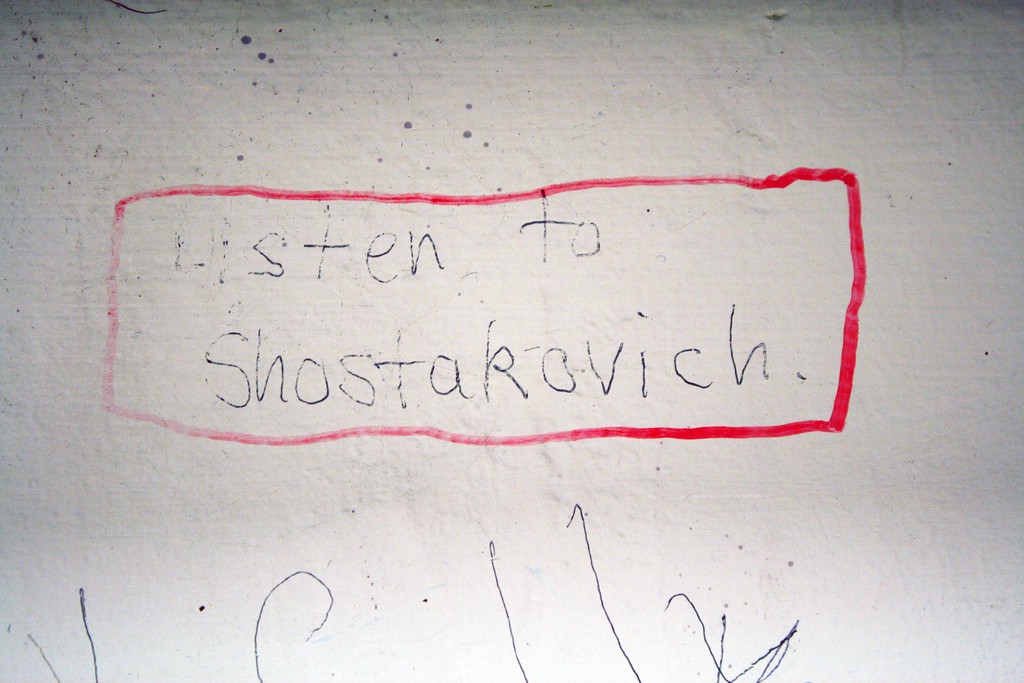
Dmitri Shostakovich is very much my boy. The way that some Tumblr girls feel about Marvel characters or CW characters, who caption their .gif sets with “protect so-and-so at all costs”? That’s me and Shostakovich. He’s just my nervous little guy. I feel so bad for him. All he wanted to do was compose his music all the while being upstaged, essentially, by Joseph Stalin and the rise of Communism. Did anyone else write a paper on a historical figure when they were approximately nineteen years old and now feel a fierce maternal affection for them? Please chime in.
Shostakovich’s history is immense and troubled and very necessary to understand, I believe, to get a full grasp on any of his pieces. I first played Festive Overture when I was in high school and thought it was a blast. It’s like a rip-roaring, 6-minute little adventure. It was tough in high school to be a timpanist if only because a lot of being a timpanist (or a concert percussionist, generally speaking) involves sitting and counting rests until you play once every, say, 4–15 minutes. I don’t care how good your attention span is as a fifteen-year-old, that shit is impossible. So you have Festive Overture, which is not only relatively short, but has a full, bouncing percussion section complete with an essential snare drum feature at the 2:34 mark. The whole thing just moves. By the time you hit the final fanfare at the 4:50 mark, it’s kind of like, “Oh man, it’s almost over? It just started.”
For this week’s recording, I’ve chosen the London Symphony Orchestra in 2011. You should start listening to it now and then read the rest of this. Okay? Okay.
Shostakovich is perhaps one of the least approachable composers I’ve wanted to write about so far, in part because his work is something of a chameleon. Festive Overture is the easiest entry point, I’d imagine, for someone who’s not familiar with the Russian composer’s work. Shostakovich is also the most modern of the composers I’ve written about so far, born in 1906 and having died in 1975. This puts him right smack in the middle of Every Important Thing To Happen In The 20th Century Minus Disco.
The reason I feel so tenderly for Shostakovich is that to be an artist of any kind during the reign of Stalin was to live in a constant state of terror. I mean, basically anyone living under Stalin lived under a constant state of terror, but you get where I’m going. For the first near decade of his life, 1927, when he graduated, to 1936, Shostakovich was able to compose at will. In 1936, however, Stalin attended Shostakovich’s Lady Macbeth opera, which was later panned in Pravda, the official newspaper of the Communist party for being “coarse, primitive and vulgar.” Ay yi yi. From there, Shostakovich withdrew from society for nearly a year, focusing on his family and taking a break from writing. In the meantime, he saw the execution or disappearance of many of those close to him, including his patron Marshal Tukhachevsky, his brother-in-law Vsevolod Frederiks, his friend Nikolai Zhilyayev (a musicologist), his mother-in-law, his friend the Marxist writer Galina Serebryakova, and his colleagues Boris Kornilov and Adrian Piotrovsky.
Shostakovich eventually returned to the scene in 1937 — taking a full year off as a professional composer was a fairly big deal, this wasn’t like now when you can just cash in on miles and go to Bali for a year and everyone is like, “this is fine.” In 1937, he launched something of a rebranded self with his Fifth Symphony (we’ll get there eventually, I promise) who was Very Into Communism And Stalin And The State, which, obviously, of course, he wasn’t, but it needed to be done in order to secure both his and his family’s survival. From there, Shostakovich became something of a crown jewel of the Soviet Union during the Second World War, his music seemingly nationalistic to the powers that be.
So let’s go back to Festive Overture, the fun little jaunt that my high school self loved to play. Festive Overture was composed in 1954 at a concert at the Bolshoi Theatre to commemorate the 37th anniversary of the October Revolution. Why is 37 a significant number of commemorate? Uh??? I don’t know. What is wild, however, is that Shostakovich wrote Festive Overture in three days. Knowing that and listening to it, it does feel a little, “Ah, shit, I gotta get this done.”
There’s that level of it, the general sort of rushed “I need to get my overture turned in on time or everyone will be mad” aspect to the tone of it, and then here’s this: the 37th anniversary of the October Revolution was, in fact, very significant because it was a year after Stalin’s death. And while this overture is in no way connected to that — that piece, in fact, would be Shostakovich’s 10th symphony, which, you know, I’ll get to eventually — it does have this nervous, almost relieved energy to it? If you know to look for it, that is. This is also the first and only piece that Shostakovich conducted himself. I can’t help but picture him, this poor anxious guy, terrorized by the state for twenty years, stepping up on stage to conduct this piece. It’s very cute? I mean, obviously it’s not cute at all, but there’s something darkly funny about it.
So now start the piece over. It’s short, you can listen to it twice, it’ll be fine. You don’t have that much to do for 12 minutes of your life. It’s still triumphant and fun, no doubt, but now you’ll be able to sense the tension, the uneasiness of it. It feels like someone who might be on the run from a lot of different things, all the while forced to shout back “No, no, I’m not running from you at all!!!” Like I said, protect Shostakovich at all costs.
Fran Hoepfner is a writer from Chicago. You can find a corresponding playlist for all of the pieces discussed in this column here.
What On Earth is Trump Doing Between Tweets?
He consistently takes five-minute pauses to complete a thought.
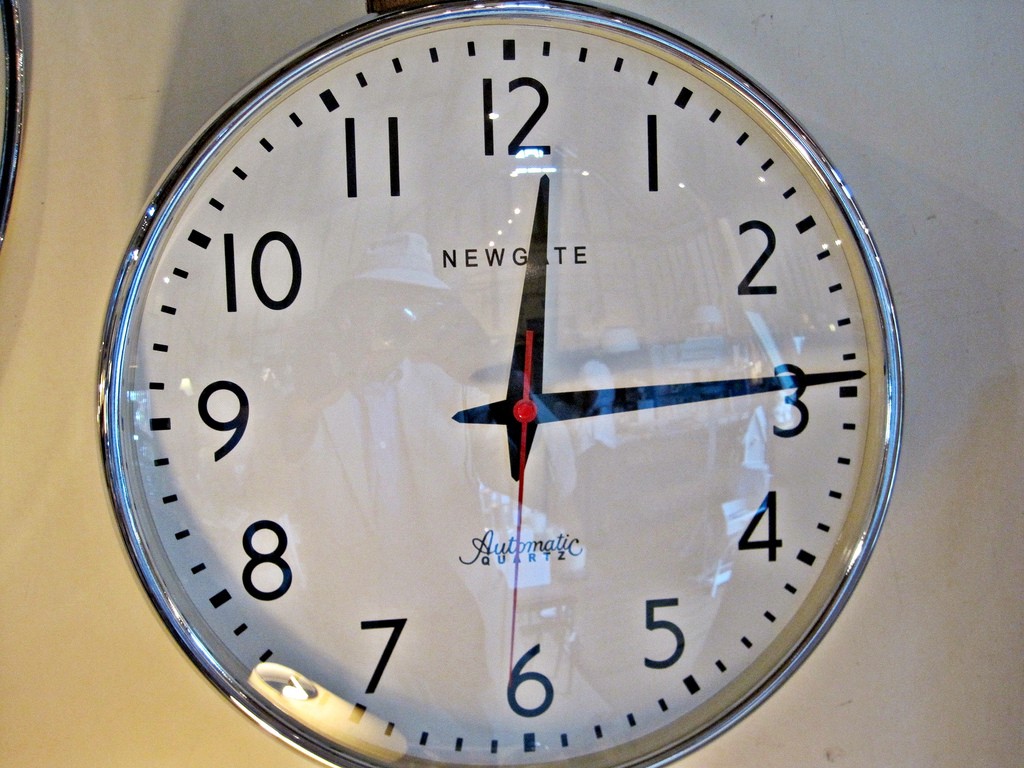
There’s something odd with the way Donald Trump tweets. It’s not just that he does it — though that’s pretty weird for a president-elect, if Obama’s two-tweet transition in 2008 is any benchmark — but that topic is beyond exhausted. It’s not even when he does it—very late and very early—which has also been widely noted.
What I want to talk about is a perturbing and previously un-discussed quirk in the way Donald Trump posts multi-tweet screeds.
I’m sure I’m not the only one who’s noticed this. Let’s see if you can spot it:
It would have been much easier for me to win the so-called popular vote than the Electoral College in that I would only campaign in 3 or 4–
states instead of the 15 states that I visited. I would have won even more easily and convincingly (but smaller states are forgotten)!
Keen observers will note the timestamps. Seven minutes elapsed between these two posts.
Bathroom break, perhaps? Seems unlikely, but who knows! Given that the second tweet is merely the latter half of a single sentence, it’s strange that it took Donald Trump seven minutes to finish a very simple thought.
Maybe it was an aberration. Let’s assess:
I will be holding a major news conference in New York City with my children on December 15 to discuss the fact that I will be leaving my ...
great business in total in order to fully focus on running the country in order to MAKE AMERICA GREAT AGAIN! While I am not mandated to ....
do this under the law, I feel it is visually important, as President, to in no way have a conflict of interest with my various businesses..
Hence, legal documents are being crafted which take me completely out of business operations. The Presidency is a far more important task!
Hmmm, let’s see… we had five minutes between the first two, then ten, followed by another five-minute pause to close the four-tweet thread. That would be a lot of bathroom breaks.
Let’s see what else we have:
Did China ask us if it was OK to devalue their currency (making it hard for our companies to compete), heavily tax our products going into..
their country (the U.S. doesn't tax them) or to build a massive military complex in the middle of the South China Sea? I don't think so!
How might this have gone down? It’s possible Trump started his statement — we don’t bow to China, they’re screwing the American working class, etc. — but realized midway through he needed some new material. The jobs and tariff stuff is a bit stale, after all.
Did he pause to research other points of diplomatic tension between the U.S. and China? Trump, dismissive of intelligence briefings and an unenthusiastic consumer of non-Trump-related world affairs, likely lacks a nuanced understanding of Asia-Pacific’s most contentious geopolitical issues. If he intended to make a well-balanced statement rooted in a larger diplomatic strategy, he’d probably need to consult with someone on the issues.
But somehow that feels too deliberative, given what we know about the president-elect. If you’re actually concerned about the details of your statement and the implications of what you’re planning to say, why start tweeting before you’ve decided on a messaging strategy?
What about that tweetstorm where he strangely announced that the “UNITED STATES IS OPEN FOR BUSINESS,” how did that one come together?
The U.S. is going to substantialy reduce taxes and regulations on businesses, but any business that leaves our country for another country,
fires its employees, builds a new factory or plant in the other country, and then thinks it will sell its product back into the U.S. ......
without retribution or consequence, is WRONG! There will be a tax on our soon to be strong border of 35% for these companies ......
wanting to sell their product, cars, A.C. units etc., back across the border. This tax will make leaving financially difficult, but.....
these companies are able to move between all 50 states, with no tax or tariff being charged. Please be forewarned prior to making a very ...
expensive mistake! THE UNITED STATES IS OPEN FOR BUSINESS
All over the map! The first three pauses lasted eight minutes, before a *sixteen*-minute mid-sentence pause. From there, it was another two minutes before he concluded the series.
This is a very weird way to tweet!
It even happens when he’s quoting someone else. For example, as Jill Stein’s futile and largely irrelevant recount effort gained steam, The Donald opined:
Hillary's debate answer on delay: "That is horrifying. That is not the way our democracy works. Been around for 240 years. We've had free --
and fair elections. We've accepted the outcomes when we may not have liked them, and that is what must be expected of anyone standing on a -
during a general election. I, for one, am appalled that somebody that is the nominee of one of our two major parties would take that kind --
of position." Then, separately she stated, "He said something truly horrifying ... he refused to say that he would respect the results of --
this election. That is a direct threat to our democracy." She then said, "We have to accept the results and look to the future, Donald --
Trump is going to be our President. We owe him an open mind and the chance to lead." So much time and money will be spent - same result! Sad
Six, seven, ten, five, six. This one is so weird — he was quoting someone! How were these not ready to go in one more-or-less immediate blast?
(He also sort of screwed up the quote, but... Character limits are hard!!)
There are a few possible explanations. That he’s considering the next tweet in terms of messaging, as noted above, seems unlikely.
Could it be that, between all these tweets, Donald Trump is wrestling with spelling and syntax and phrasing? That he’s carefully crafting each tweet in real-time? Second-guessing the delivery, trying to grapple with character limits, seeing what works by trial and error?? We all do it! That our president-elect does so as well is not outside the realm of possibility, and these tweets were all sent from an Android device. (When tweeting on his behalf, his staff uses an iPhone or web client.)
Plus, the idea of Trump sitting at his desk formatting multiple tweets to create a single sentence or narrative, often for periods close to an hour — brow furrowed, shoulders hunched, mouth puckered, his tiny fingers furiously pecking away — is hilarious (also: believable and kind of scary).
Another option is that it’s a strategic play to monopolize eyeballs for as long as possible. Take this week, for example, in two posts aimed at quelling public concern around his potential conflicts of interest:
Even though I am not mandated by law to do so, I will be leaving my busineses before January 20th so that I can focus full time on the......
Presidency. Two of my children, Don and Eric, plus executives, will manage them. No new deals will be done during my term(s) in office.
In the six minutes between these tweets, it’s easy to imagine the Twitterati on their toes, waiting to learn what, exactly, Donald Trump was going to focus full-time on. Are these pauses a legitimate strategy for engaging more people? Ehhh… he’s the president-elect, and everyone’s already breathlessly parsing every one of his tweets, for better or worse — whether they’re posted over two minutes or 40 makes no difference. (Just ask Lockheed Martin!) A few moments of suspense wouldn’t meaningfully change the equation from a strategic perspective.
Another theory seems awfully small, even for Donald Trump: he’s just getting his jollies and loves to lord over the peasants beneath him. We can be certain that every journalist and pundit who saw the first tweet did little in the interim apart from speculating about tweets to come and preparing their own Twitter take — and he hates journalists and pundits! Perhaps that small bit of power simply gets him off, however alarming such petty behavior would be.
The most depressing possibility is that he doesn’t have the attention span to maintain a tweetstorm in real-time, lacks the awareness to know that tweetstorms in general are Capital-B Bad and that if it requires more than one or two posts there’s probably a better venue for the message, and doesn’t possess the foresight to prepare these things in advance.
Someone please help. I don’t know what to make of it. What on earth could he possibly be doing between these tweets?
James Richard Weir is based in Shanghai, where he previously covered Chinese healthcare policy and currently works in communications.
Donald Trump And Divinity
God or Vlad?

“To what extent,” asks Masha Gessen, “can Putin provide insight into Trump’s understanding of power?”
When I published a biography of Putin in 2012, some American reviewers criticized the book for asserting that Putin was merely an “ordinary man [whom voters could invest] with whatever they wanted to see in him.” I argued that an unqualified man of limited intelligence had by accident come to rule a nuclear power. That simply does not happen, some reviewers claimed. It does. History contains a multitude of accidents, some of them decisive, but we insist on imbuing events with logic. No one wants to see this logic more than the men like Putin and Trump, who think of themselves as anything but accidental. But if their ascent was preordained despite their lack of qualifications, then a force more powerful than any political party or any voting system must be at play. It may be God’s will, providence, or their innate greatness: one way or the other they were chosen.
Other people have questions too.
Do you think the Russians interfered with the outcome of the U.S. election or was it God?
Life is full of mystery.
DJ Shadow, "Bergschrund" (feat. Nils Frahm)
As you may have heard, it’s cold outside.
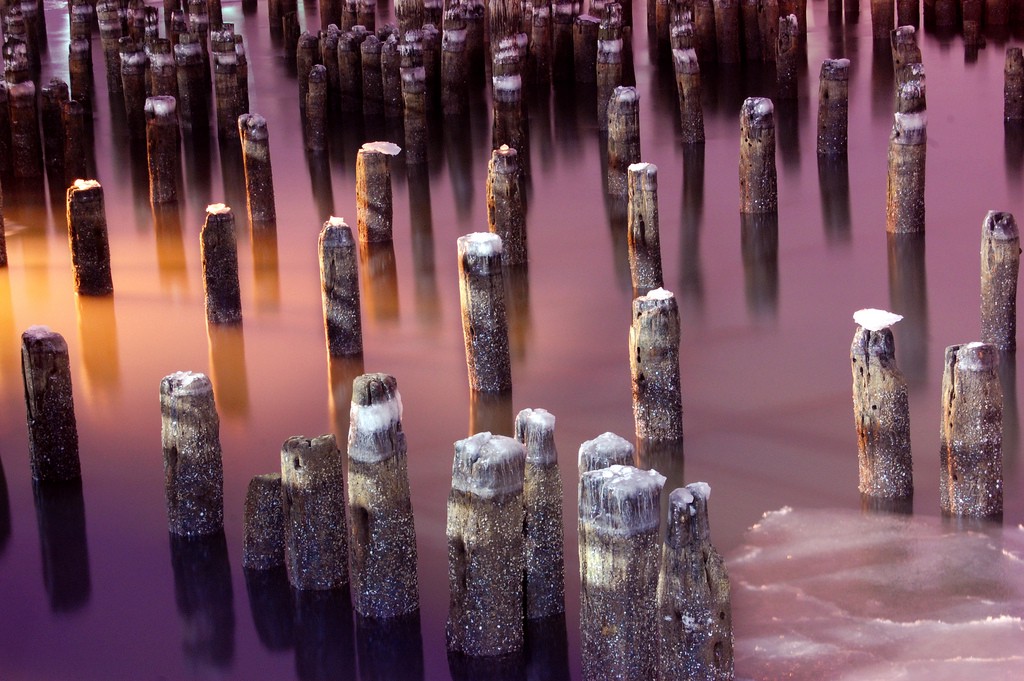
Stay indoors. Stay indoors for the next two days. Do not go out. Do not look at the Internet, because that will make you want to go out. Wrap yourself in something warm and park yourself on a couch or bed and drift through sleep — the only pleasant thing left in your life — for the next 48 hours. You won’t be missing anything but extreme cold outdoors and stupidity in all its varying forms everywhere else. I would actually recommend you do this for the next four years but it’s not practical at this point. Maybe you should consider this a dry run for your forthcoming semi-comatose existence. Anyway, it’s cold out there. Stay warm. Stay indoors. Here’s some music.
